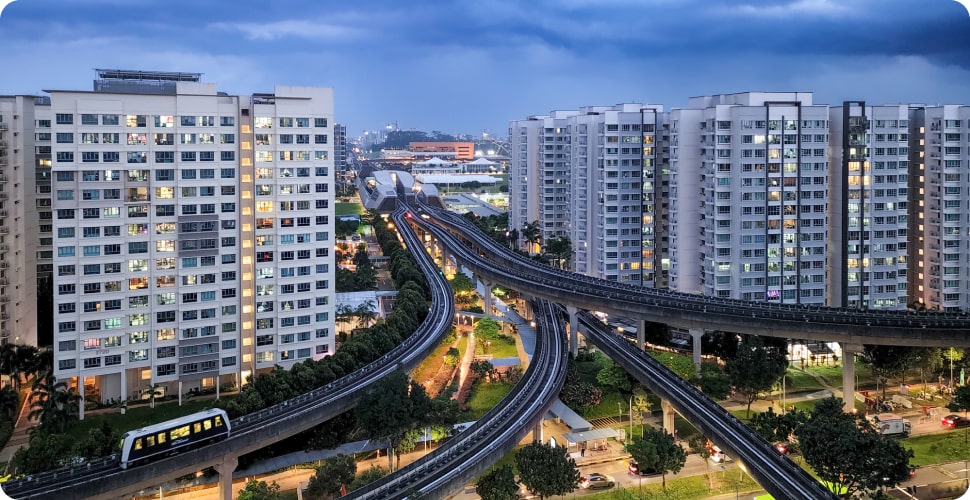Singapore Real Estate vs Overseas Property Investment – When it comes to building long-term wealth, real estate remains one of the most reliable asset classes worldwide. In Singapore, property has consistently shown resilience and steady growth, making it a preferred choice among investors. However, with globalization and increasing opportunities abroad, many Singaporeans are also exploring overseas property markets as an alternative or complement to their local portfolios.
This raises an important question: Should you invest in Singapore real estate, or is overseas property investment a smarter move? Both options come with their own sets of advantages, challenges, and risks. In this blog, we’ll compare the two in detail, exploring factors such as market stability, regulations, financing, rental yields, and long-term prospects to help you make an informed decision.
Why Singapore Real Estate Appeals to Investors
1. Market Stability and Strong Demand
Singapore’s property market is well-known for its stability. Despite global economic downturns, the city-state has managed to maintain a relatively strong real estate sector, thanks to its robust economy, transparent governance, and political stability.
The demand for housing continues to remain strong due to population growth, urban development, and the country’s role as a global financial hub. Limited land supply further fuels the appreciation of property prices over time.
2. Government Regulations That Protect Buyers
The Singapore government has implemented strict regulations such as the Additional Buyer’s Stamp Duty (ABSD), loan restrictions, and cooling measures. While these may appear as barriers, they actually play a vital role in keeping the market sustainable by preventing bubbles.
Such frameworks provide investors with confidence that their investments are secure and unlikely to experience extreme volatility.
3. Strong Rental Demand
With Singapore being home to multinational corporations, universities, and expatriates, there is steady rental demand. Properties in prime areas and emerging townships can generate attractive rental yields, making real estate investment a lucrative option.
4. Long-Term Capital Appreciation
Over the years, property values in Singapore have shown consistent appreciation. Even during economic slowdowns, the market tends to recover quickly. This resilience makes Singapore real estate a reliable long-term investment vehicle.
Why Consider Overseas Property Investment?
1. Potentially Lower Entry Costs
One of the key reasons investors look abroad is affordability. Properties in countries like Malaysia, Thailand, Vietnam, or even parts of Europe can be purchased at a fraction of the cost of Singapore properties. For investors with a tighter budget, this provides a way to diversify without the high upfront costs.
2. Higher Rental Yields in Some Markets
Certain overseas markets offer higher rental yields compared to Singapore. For example, properties in emerging economies with rising urbanization often promise returns of 6–8% or more annually. This can be appealing for investors seeking faster returns on investment.
3. Portfolio Diversification
Investing overseas allows you to spread your risk across multiple markets. This diversification can protect you against local downturns. If the Singapore property market experiences a cooling phase, overseas investments could balance your portfolio with returns from different regions.
4. Lifestyle and Residency Benefits
Some countries offer residency or citizenship opportunities through property investment. For those who aspire to live, work, or retire abroad, this is an added advantage. Locations like Portugal, Greece, and Spain are popular among investors for their Golden Visa programs.
Comparing Singapore Real Estate vs Overseas Property Investment
1. Market Risk and Volatility
- Singapore: The market is tightly regulated, reducing volatility. While capital appreciation may be slower compared to some emerging markets, the risk is also lower.
- Overseas: Markets can be less predictable due to political instability, currency fluctuations, and regulatory changes. High potential returns often come with equally high risks.
2. Financing and Accessibility
- Singapore: Financing is straightforward, with local banks offering clear loan structures. However, restrictions such as the Total Debt Servicing Ratio (TDSR) limit borrowing capacity.
- Overseas: Financing can be more complicated. Some banks in Singapore may not provide loans for overseas properties, requiring investors to rely on foreign banks with stricter terms or higher interest rates.
3. Rental Yield and Occupancy
- Singapore: Rental yields are moderate, typically ranging between 2–4%. Demand is strong but competition is high.
- Overseas: Certain overseas cities promise yields of 6–10%, but occupancy rates and tenant reliability can be uncertain.
4. Legal and Tax Considerations
- Singapore: The legal framework is clear and transparent, making transactions safe for investors. Taxes are straightforward, though ABSD can add costs for multiple property owners.
- Overseas: Taxation varies by country. Some jurisdictions impose higher property taxes, inheritance taxes, or capital gains taxes that investors may overlook. Legal frameworks may also differ, posing risks for inexperienced buyers.
5. Currency Risk
- Singapore: Investors benefit from the stability of the Singapore dollar, which is one of the world’s strongest currencies.
- Overseas: Currency fluctuations can significantly impact returns. Even if property values increase locally, a weaker exchange rate could reduce your overall profit.
6. Exit Strategy
- Singapore: Selling property is relatively straightforward due to high demand. Liquidity in the market is strong.
- Overseas: Depending on the country, it may take longer to sell a property, especially in less mature markets.
Case Example: Local Investment Opportunity
For instance, upcoming executive condominiums such as Tampines Street 95 EC present excellent opportunities for local investors. Such projects combine affordability with growth potential, especially since they are located in developing townships with strong future connectivity and infrastructure.
This highlights why many investors continue to prioritize Singapore real estate—it offers a balance between affordability (for ECs), security, and long-term appreciation.
Key Considerations Before You Decide
1. Your Risk Appetite
If you prefer stability and steady growth, Singapore real estate may be the better option. If you are comfortable with risk and seeking higher yields, overseas markets could be attractive.
2. Your Investment Horizon
For short- to mid-term rental income, overseas investments may offer better returns. For long-term appreciation and security, Singapore is the safer bet.
3. Due Diligence
Regardless of location, proper research is essential. For overseas investments, consider engaging local property consultants, legal advisors, and tax experts to avoid costly mistakes.
4. Regulatory Updates
Both Singapore and overseas markets are subject to regulatory changes. Stay informed about new policies, taxes, or restrictions that could affect your returns.
The Future Outlook
- Singapore Real Estate: The market is expected to remain resilient, with steady growth fueled by limited land supply, infrastructural developments, and strong demand. Government measures will likely continue to ensure sustainability.
- Overseas Property Investment: The outlook varies by region. Emerging economies may continue to offer strong growth, while developed markets provide stable returns. Investors should carefully assess economic and political climates before committing.
Conclusion
Both Singapore real estate and overseas property investments have their unique advantages and challenges.
- Singapore real estate offers security, long-term capital appreciation, and strong demand, making it an ideal choice for conservative investors.
- Overseas property investment can provide higher rental yields, diversification, and lifestyle benefits, but it comes with greater risks, such as legal complexity and currency fluctuations.
Ultimately, the best choice depends on your financial goals, risk tolerance, and investment strategy. For many investors, a balanced portfolio that includes both Singapore and overseas properties may be the most effective approach. By carefully assessing your objectives and doing thorough research, you can build a resilient real estate portfolio that grows steadily over time.




